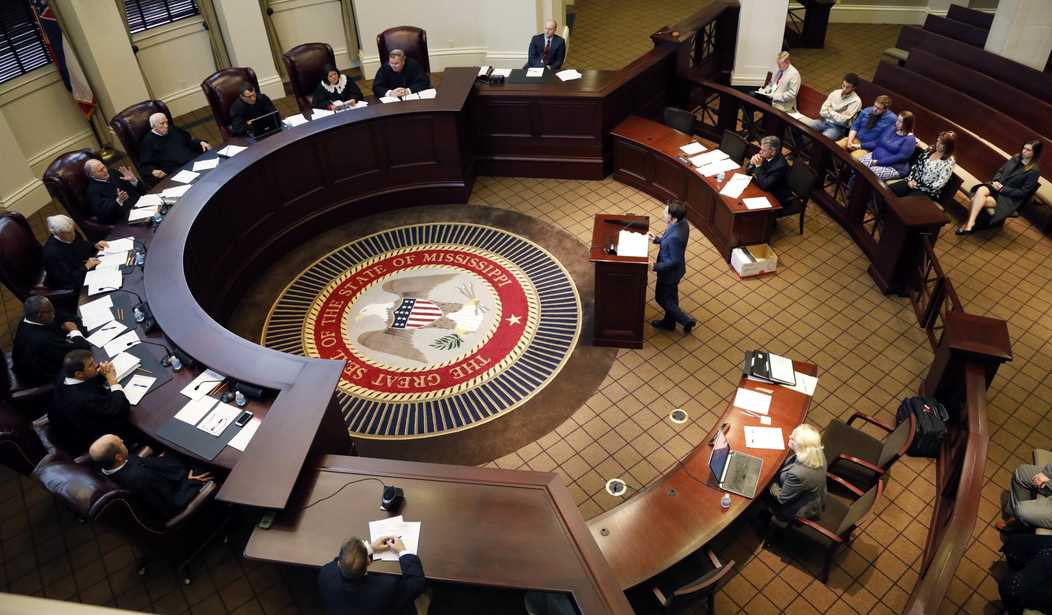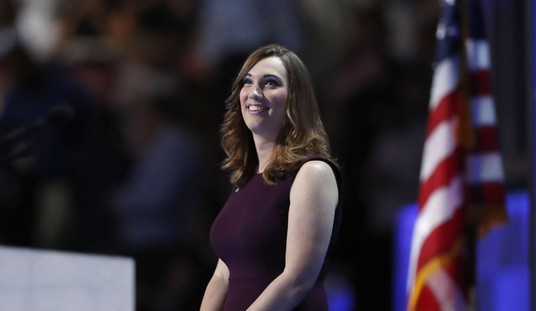The Mississippi Supreme Court heard arguments this week on whether a boy born to a woman in a lesbian union should be considered the biological son of his mother’s lesbian spouse. A county judge ruled against the former lesbian spouse on the grounds that two women cannot conceive a child and thus be biological parents. In legal arguments, the woman claims that this is unconstitutional discrimination against same-sex marriages.
The legal battle concerns Christina “Chris” Strickland, a 44-year-old woman who wants to be listed as the legal parent of 6-year-old Zayden Strickland. Strickland hopes to gain equal custody with her former wife Kimberly Day, who bore Zayden after the boy was conceived through artificial insemination with eggs from Day and sperm from an anonymous donor.
Strickland and Day divorced last year, and Strickland wants the state to recognize her as the boy’s parent, even forcing the hospital to change his birth certificate to recognize her as the a mother.
The problem? It is biologically impossible for two women to conceive a child and thus be considered parents, according to Rankin County Chancery Judge John Grant.
“The court finds two women cannot conceive a child together,” Grant wrote in his decision. “The court doesn’t find its opinion to be a discriminatory statement, but a biological fact.”
The judge admitted that “the natural father may never come into court. He may never be known and probably won’t be, but he is still a father; and that is a right that our Supreme Court has recognized for many, many years.” There are legal avenues to remove the donor’s parental rights, but Strickland did not pursue them.
Fundamentally, Grant suggested, Strickland is the boy’s adoptive parent, and therefore the hospital was right to not include her name on the boy’s birth certificate, in accordance with Mississippi law.
Strickland’s attorney, Lambda Legal Counsel Beth Littrell, argued that this law is unconstitutional, as it violates the 2015 Supreme Court ruling legalizing same-sex marriage, Obergefell v. Hodges.
“Supreme Court decisions, and the experience of scores of mothers and children with deadbeat dads, show that biology alone does not make you a parent,” Littrell said in a statement Wednesday. Note that statement: “biology alone does not make you a parent.”
“Marriage equality is the law of the land in Mississippi despite HB 1532 or the lower court’s attempt to demean Chris and dismiss her rights as a parent simply because she was married to another woman,” the lawyer claimed.
Under Mississippi law, there is a presumption that the husband of a child’s mother is considered the father of that child. This can be overcome by DNA evidence or an “Affidavit of Denial of Paternity,” where mother and husband agree the husband is not the child’s father.
LGBT groups like Lambda Legal argue that this presumption must be extended to same-sex couples. Earlier this year, the U.S. Supreme Court ordered Arkansas to put the names of two women as parents on birth certificates, saying same-sex couples must receive “the constellation of benefits that the States have linked to marriage.” The Arizona Supreme Court ruled that married same-sex couples should get the same presumption of parentage opposite-sex couples receive.
“By denying Chris’ status as the full legal parent of the children, the Court has marked her child as illegitimate and their family as inferior and somehow unworthy of the usual parenting protections that come with marriage,” the LGBT group argued. “The U.S. Supreme Court’s 2015 marriage ruling in Obergefell v. Hodges calls for greater respect for the families formed by same-sex couples and their recognition as full-fledged parents of their children.”
Day’s attorney, Prentiss Grant (no relationship to Judge Grant), defended the law considering Day — and not Strickland — the boy’s mother.
“This case is not an equal protection case or a presumption of marriage case,” Grant wrote. “It is an assisted reproduction case. The main question here is simple: whether a couple, same-sex or opposite-sex, who conceives and has a child through assisted reproduction technology using donor sperm, donor egg, or a surrogate mother should be required to follow existing law and terminate the parental rights of the donor or surrogate. The answer is a resounding yes.”
In attempting to change this law, LGBT groups are redefining the meaning of parenthood itself, rejecting a vision tied to the biological reality that children are conceived by a father’s sperm and a mother’s egg.
Lambda Legal attempted to hide this by reframing the argument. “The court ruled that Chris was not a legal parent to the child born during her marriage because the anonymous sperm donor’s rights as a father supersede Chris’ rights as his second parent,” the group noted.
This statement captured the change in a nutshell: Lambda Legal wants Mississippi to strike down the gendered terms “mother” and “father,” replacing them with the idea of rights given to a “second parent.”
This is a logical extension of removing the gender of two people in the same-sex marriage debate, but while many people are attracted to members of the same sex, no children are naturally conceived by a woman and a woman. (Even the so-called “three-parent baby” method, which involves replacing some DNA from one parent with DNA from a third party, still involves one egg and one sperm cell uniting from a father and a mother.)
As in the same-sex marriage debate, Lambda Legal emphasized the human side to argue for striking down the notion of gendered parenthood.
“This child really needs to have a legal relationship to both people who brought him into the world and who he knows and understands to be his only parents, not some anonymous sperm donor,” Littrell argued. “Christina should have been recognized on the birth certificate at the time.”
By claiming that Strickland “brought him into the world,” Littrell denied the biological reality that the boy was conceived by Day and an anonymous donor, not by Strickland. While the lesbian wife may have been devoted to raising the child since before his birth, and while she was involved during and after the birth, she only played an ancillary role in “bringing him into the world.”
This is not to deny the pivotal role Strickland played in the boy’s life. Her position is similar to that of a man who marries a woman pregnant with another man’s child. Such an adoptive father is essential to the child’s well-being, and deserves recognition — but he remains an adoptive father, not a biological one.
Mississippi law clearly states that if a husband is not the biological father, and declares that to be so, he does not gain the presumption of paternity. In the case of a same-sex couple, this presumption does not make sense.
Strickland argued that she has “earned the right to be a parent in every sense of the word.” She added, “Our boys are the world to me, and they deserve the right to both of their parents. I promise to love and care for them for the rest of my life.”
These are good arguments for giving her some form of custody, but they are not evidence of unconstitutional anti-LGBT discrimination. They are also not good arguments for removing the biological definition of parents as a mother and father on birth certificates.
Perhaps Strickland should receive shared custody over her adopted son, but the legal arguments to achieve this would have far-reaching consequences unwarranted by the case at hand.









Join the conversation as a VIP Member